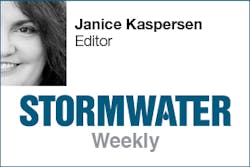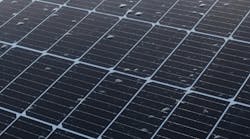
StormCon, the only North American event dedicated exclusively to stormwater and surface-water professionals, is seeking abstracts for presentation at StormCon 2016. The deadline for submitting abstracts is Wednesday, December 9.
The conference will be held in Indianapolis, IN, August 22–25, 2016, and for the first time will be colocated with another large show that also attracts attendees from the municipal arena: WASTECON, the premier solid waste industry-focused conference, put on by the Solid Waste Association of North America (SWANA). Many of the same high-level public works officials have responsibilities in both the stormwater and solid waste arenas. Holding the conferences in the same place allows attendees to get the best of both worlds in the joint exhibit hall and in the educational sessions.
This year StormCon seeking abstracts in seven conference tracks:
BMP Case Studies. This track presents examples of how structural and nonstructural best management practices (BMPs) are being used, with case studies and performance data. Topics include filtration systems; retention and detention systems; post-construction stormwater management; urban retrofitting; and inspection, maintenance, and repair of BMPs.
Green Infrastructure. This track includes low impact development techniques, as well as smart growth and other green infrastructure practices that strive to maintain or mimic the predevelopment hydrology of a site by infiltrating, storing, filtering, and evaporating stormwater runoff rather than moving it offsite. Areas of focus for this track include infiltration and bioretention practices such as rain gardens, green roofs, and porous pavement; community-wide and watershed-scale approaches to water quality; rainwater harvesting; and green infrastructure for infill development and redevelopment areas.
Stormwater Program Management. This track covers many aspects of managing a successful municipal or industrial stormwater program. Focus areas include strategies for meeting permit requirements, building public education and outreach programs, hiring and working with consultants, illicit discharge detection and elimination programs, and integrating the stormwater program with TMDL development.
Advanced Research Topics. This technical track includes academic research; methods for testing the effectiveness of best management practices and comparing different BMPs; and topics and trends in stormwater research, such as standardizing testing protocols and standards for measuring the effectiveness of BMPs.
Water-Quality Monitoring. This track focuses on watershed assessments, determining pollutant loadings, effective water-quality modeling, sampling tools and techniques, and bacterial detection and identification.
Industrial Stormwater Management. This track covers industrial stormwater management and permitting, focusing on publicly and privately owned facilities covered by industrial stormwater permits or EPA’s stormwater multi-sector general permit. Such facilities range from small businesses located in urban areas, such as restaurants and automotive repair shops, to large sites such as manufacturing plants, transportation facilities, and mining operations.
Stormwater Management for Solid Waste Facilities. An offshoot of the Industrial Stormwater Management track added because of this year’s colocation with WASTECON, this track deals with stormwater management for all phases of solid waste operations. Topics include managing stormwater at municipal waste receiving, processing, and transfer facilities; good housekeeping practices for collection vehicle fleet maintenance facilities; managing stormwater on operating landfill sites; and selection, installation, and maintenance of stormwater management systems on closed landfill sites.
For more information about StormCon, including the complete call for papers and an online form for submitting your abstract, visit www.StormCon.com.
About the Author
Janice Kaspersen
Janice Kaspersen is the former editor of Erosion Control and Stormwater magazines.

